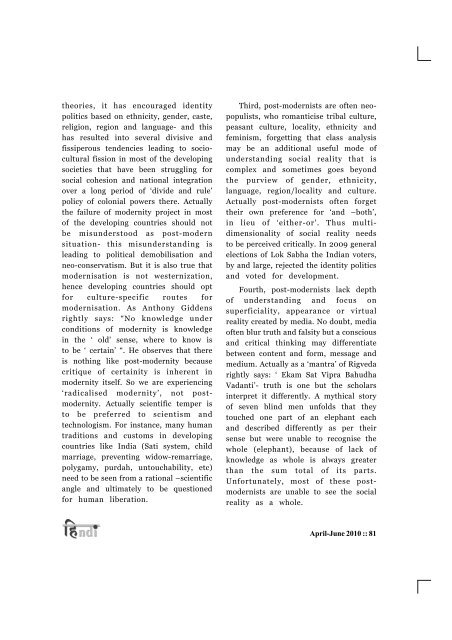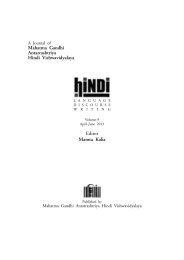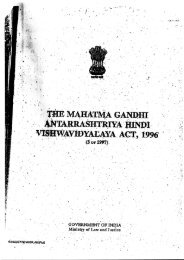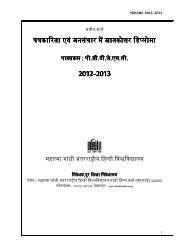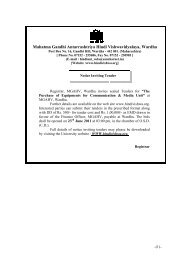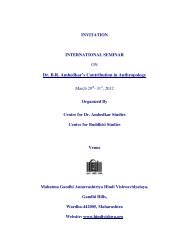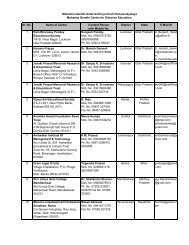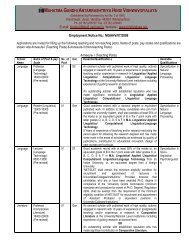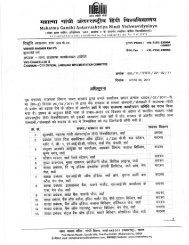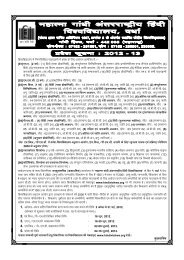Mamta Kalia
Mamta Kalia
Mamta Kalia
You also want an ePaper? Increase the reach of your titles
YUMPU automatically turns print PDFs into web optimized ePapers that Google loves.
theories, it has encouraged identity<br />
politics based on ethnicity, gender, caste,<br />
religion, region and language- and this<br />
has resulted into several divisive and<br />
fissiperous tendencies leading to sociocultural<br />
fission in most of the developing<br />
societies that have been struggling for<br />
social cohesion and national integration<br />
over a long period of ‘divide and rule’<br />
policy of colonial powers there. Actually<br />
the failure of modernity project in most<br />
of the developing countries should not<br />
be misunderstood as post-modern<br />
situation- this misunderstanding is<br />
leading to political demobilisation and<br />
neo-conservatism. But it is also true that<br />
modernisation is not westernization,<br />
hence developing countries should opt<br />
for culture-specific routes for<br />
modernisation. As Anthony Giddens<br />
rightly says: “No knowledge under<br />
conditions of modernity is knowledge<br />
in the ‘ old’ sense, where to know is<br />
to be ‘ certain’ “. He observes that there<br />
is nothing like post-modernity because<br />
critique of certainity is inherent in<br />
modernity itself. So we are experiencing<br />
‘radicalised modernity’, not postmodernity.<br />
Actually scientific temper is<br />
to be preferred to scientism and<br />
technologism. For instance, many human<br />
traditions and customs in developing<br />
countries like India (Sati system, child<br />
marriage, preventing widow-remarriage,<br />
polygamy, purdah, untouchability, etc)<br />
need to be seen from a rational –scientific<br />
angle and ultimately to be questioned<br />
for human liberation.<br />
Third, post-modernists are often neopopulists,<br />
who romanticise tribal culture,<br />
peasant culture, locality, ethnicity and<br />
feminism, forgetting that class analysis<br />
may be an additional useful mode of<br />
understanding social reality that is<br />
complex and sometimes goes beyond<br />
the purview of gender, ethnicity,<br />
language, region/locality and culture.<br />
Actually post-modernists often forget<br />
their own preference for ‘and –both’,<br />
in lieu of ‘either-or’. Thus multidimensionality<br />
of social reality needs<br />
to be perceived critically. In 2009 general<br />
elections of Lok Sabha the Indian voters,<br />
by and large, rejected the identity politics<br />
and voted for development.<br />
Fourth, post-modernists lack depth<br />
of understanding and focus on<br />
superficiality, appearance or virtual<br />
reality created by media. No doubt, media<br />
often blur truth and falsity but a conscious<br />
and critical thinking may differentiate<br />
between content and form, message and<br />
medium. Actually as a ‘mantra’ of Rigveda<br />
rightly says: ‘ Ekam Sat Vipra Bahudha<br />
Vadanti’- truth is one but the scholars<br />
interpret it differently. A mythical story<br />
of seven blind men unfolds that they<br />
touched one part of an elephant each<br />
and described differently as per their<br />
sense but were unable to recognise the<br />
whole (elephant), because of lack of<br />
knowledge as whole is always greater<br />
than the sum total of its parts.<br />
Unfortunately, most of these postmodernists<br />
are unable to see the social<br />
reality as a whole.<br />
April-June 2010 :: 81


